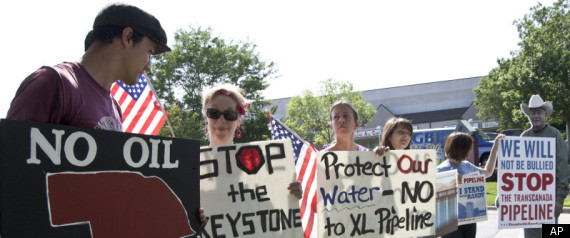 WASHINGTON - The U.S. State Department's environmental analysis of TransCanada's proposed Keystone XL pipeline has given the project a thumbs up.
WASHINGTON - The U.S. State Department's environmental analysis of TransCanada's proposed Keystone XL pipeline has given the project a thumbs up.State Department officials say there's no indication the pipeline would spur further oilsands production or pose any significant risks to the six U.S. states that it will cut through, as it carries crude from northern Alberta to Gulf Coast refineries in Texas.
"It's not a decision," State Department official Kerri-Ann Jones explained during a conference call. "It's one piece of the information that will be considered."
The assessment moves the Obama administration a step closer to a final decision on the pipeline. It now has 90 days to determine whether the controversial project is in the national interest of the United States.
The outcome isn't a surprise to the big U.S. environmental groups that are fighting the pipeline. An official for one group, the National Resources Defense Council, says State Department officials failed to conduct many of the studies the environmentalists were demanding.
Among them was an examination of whether Keystone XL could be rerouted to avoid environmentally sensitive areas in the U.S. Midwest, and to assess whether pipelines are prone to leaks.
Jim Lyon, senior vice-president of the National Wildlife Federation, said the analysis was "strike 3 for the State Department" after two "failed rounds" of environmental review.
"The document still fails to address the key concerns for landowners and wildlife. It is almost certain to be scrutinized in other venues, including a probable legal challenge. This only escalates the controversy in a process that is far from over,” Lyon said.
The State Department analysis comes as anti-pipeline activists continue a two-week civil disobedience campaign outside the White House.
More than 250 people, including Canadian actress Margot Kidder, have been arrested as they try to convince U.S. President Barack Obama to block the pipeline.
Keystone XL has become a lightning rod for the environmental movement in the U.S. in the aftermath of failed climate-change legislation last year.
Environmental activists say the project is a disaster waiting to happen and are opposed to Alberta's oilsands due to the high levels of greenhouse gas emissions involved in their production.
Proponents, meantime, say the pipeline will create thousands of jobs and help end U.S. reliance on Middle Eastern oil.
Origin
Source: Huffington
No comments:
Post a Comment